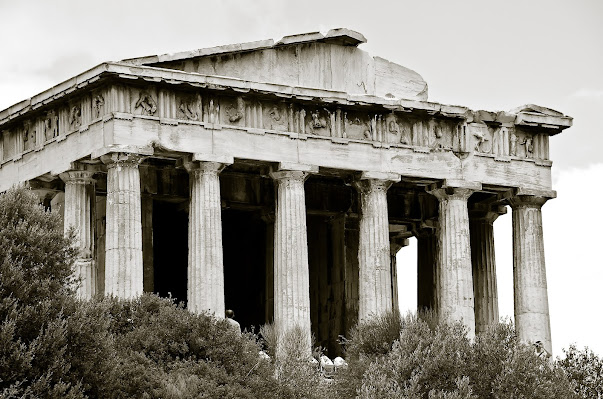Reading Notes: Homer's Odyssey, Part 1
Circe by John Flaxman, 1810
Web Source: Wikimedia Commons
There were a few things that stood out to me the most in this week's reading, and what I want to start with is how much I dislike Odysseus. He is constantly putting other people's lives in danger because of some toxic-masculinity based idea of adventure and manhood. The first time I really noticed this was when they are on the island of the Cyclops and go to Polyphemus's cave. The other men wanted to just take the goods and run away (a move that even Odysseus recognized was the smartest choice), but he insisted that they all stay because he was curious as to what kind of creature Polyphemus was. This was just so incredibly selfish, since he wasn't the one that had to pay any of the consequences. He lost six men, and that was sad for him, but he didn't seem all that cut up about it. He wouldn't even let his men mourn properly, and he never let it deter him from some other colossally stupid thing that he wanted to do, like explore Circe's Island.
My rant about Odysseus aside (for now, I'll get back to it a bit later), this did give me an interesting idea for my story this week. I think I would like to retell the story of the men in the cave and their escape from Polyphemus, but from the perspective of the men in Odysseus's company. Perhaps Eurylochus, since he is the one that later stands up to Odysseus for his constant endangerment of others' lives (though it gets him nowhere because Odysseus is so selfish). I think it might even be interesting to retell it in a way that doesn't have Odysseus as the hero. From the first-person narrative style fo the story, it is clear that Odysseus is an arrogant man. If we think of him as a real person telling his autobiography and not as a character invented by Homer, it isn't beyond the realm of possibility that Odysseus would retell the story and take credit for other people's work (almost like Gilderoy Lockhart in Harry Potter and the Chamber of Secrets).
The last thing that I really noticed in this week's reading was the fact that the gods are so nonsensical in who they choose to support and listen to. Specifically, Polyphemus calls on his father, Poseidon, after Odysseus blinds him and escapes. And Poseidon listens to him. Meanwhile, Odysseus and his men give a large sacrifice to Zeus, who does not hear their request for protection. It makes absolutely no sense, from an objective morals standpoint, why a cruel being like Polyphemus can win a god's favor, but Odysseus (who I've already established that I think is a terrible person, but at least doesn't bash in people's heads, rip them apart, and eat them) doesn't win the favor of Zeus. I think that that is part of what makes the Greek gods so interesting. Unlike many other gods, like in Christianity, Judaism, or Islam, there isn't a clear moral truth. Right and wrong are based on how the gods feel, and the gods are fickle. They're basically just immortal humans with really cool superpowers, so (like humans) they are bad at establishing a moral code that is always fitting. Some things are right, some things are wrong, but what's really wrong is if a mortal offends the gods. It's absolutely fascinating to see that difference here.
Bibliography: Homer's Odyssey, translated to English by Tony Kline, 2004



Comments
Post a Comment